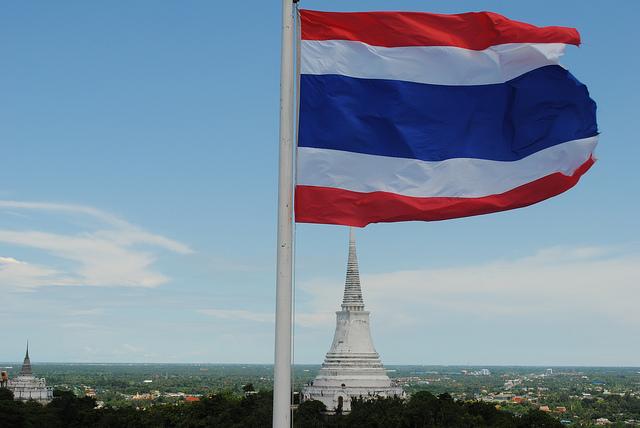Thailand: over the precipice?
Posted By John Blaxland on May 23, 2014 @ 09:44
 [1]Thailand’s Army Chief, General Prayuth Chan-ocha has detained representatives from all sides that went to meet him at the Army Club in Bangkok yesterday afternoon, finally declaring a coup. He must have known it would automatically trigger US congressionally-mandated sanctions on Thailand, so the decision can’t have been taken lightly. Indeed, Prayuth has previously admitted one of the key lessons to emerge from the 2006 coup was that military coups don’t solve the problem and the military isn’t best placed to handle a country with a vibrant economy. They just don’t teach you how to run globalised 21st-century economies at the Royal Thai Army Staff College.
[1]Thailand’s Army Chief, General Prayuth Chan-ocha has detained representatives from all sides that went to meet him at the Army Club in Bangkok yesterday afternoon, finally declaring a coup. He must have known it would automatically trigger US congressionally-mandated sanctions on Thailand, so the decision can’t have been taken lightly. Indeed, Prayuth has previously admitted one of the key lessons to emerge from the 2006 coup was that military coups don’t solve the problem and the military isn’t best placed to handle a country with a vibrant economy. They just don’t teach you how to run globalised 21st-century economies at the Royal Thai Army Staff College.
So what pushed him over the edge this time?
Prayuth declared Martial Law a couple of days ago citing an obscure and contentious century-old piece of legislation. In doing so, he called together leading political figures, including: the leader of the so-called People’s Democratic Reform Committee (PDRC), former deputy Democrat Party leader, Suthep Thaugsuban (instrumental in the last six months of protests); the former prime minister and leader of the Democrats, Abhisit Vejajiva; the leaders of the red-shirt movement, known as the UDD; representatives of the governing party (the acting interim prime minister cleverly avoided attending) and others.
The talks appear to have degenerated into a heated exchange where no one was prepared to give ground and all possible solutions involved abrogating the laws of the land in one way or another. Prayuth must have felt he was the only one who could break the impasse, and that involved increasing the stakes by ‘temporarily suspending’ rather than abrogating the constitution.
Prayuth’s actions reflect an attempt to deal with a cancer at the heart of Thai society. Bangkok locals recognise that what’s at stake in the changing power dynamics is money, power and self-interest.
Bangkok is a city that thrives on rumour-mongering, and conspiracy theorists need to be treated with a healthy degree of scepticism. They’ll posit that Prayuth did this to surreptitiously give Suthep and the elites of Bangkok exactly what they wanted. He now has to prove them all wrong. The first step towards that was to detain not just the red shirt attendants at his meeting, but Suthep and the others as well. That he appears to have done. But how long they stay detained, and who gets released first, will provide a significant indicator of his true motives.
For Prayuth to avoid a surge in further bloodshed, he needs to act—and be seen to act—as neutrally as possible, even though he’s an iconic representative of the establishment. He needs to put mechanisms in place for some reform measures to be implemented, without caving in to all of Suthep’s demands, and then ensure a speedy process to validate those measures, preferably through a referendum, followed promptly by national elections held in a free and fair manner. If this isn’t his intention, Thailand may well have just leapt over a precipice.
For now, political demonstrations have been banned and he has summoned the interim acting government for discussions. But that approach can’t last long. A moment of genius or an unmitigated disaster looms. Only time will tell.
So how should we react? In terms of Australia’s interests and responses to the crisis, it’s important to remember that Thailand has been a surprisingly good friend to Australia. Thailand is one of our most popular tourist destinations, with numbers of Australian visitors to Thailand peaking at about 700,000 a year recently. Trade ties have burgeoned in recent years as well, while security and police ties have been robust and enduring.
Thailand was the first country in Southeast Asia to offer assistance to Australia during its hour of need in the East Timor crisis of 1999, offering up the deputy commander and a battalion-sized contingent of about 1000 troops. That support was invaluable, breaking the ice in a way that let other ASEAN countries, like Malaysia, Singapore and the Philippines, follow shortly afterwards.
Before we wag our fingers at Thailand’s military for this extra-constitutional action, we should keep this in mind. We should also recognise there’s little to be gained from taking sides. Finally, Thailand’s actions should be interpreted in the regional context where the other Theravada Buddhist nations in mainland Southeast Asia, (Myanmar, Laos and Cambodia) are hardly paragons of democratic virtue.
John Blaxland is a senior fellow at the Strategic and Defence Studies Centre at the Australian National University. He is a former Australian defence attaché to Thailand and Burma from 2008-2010 and also a graduate of the Royal Thai Army Command and Staff College. Image courtesy of Flickr user Lisa Morris [2].
Article printed from The Strategist: https://aspistrategist.ru
URL to article: /thailand-over-the-precipice/
URLs in this post:
[1] Image: https://aspistrategist.ru/wp-content/uploads/2014/05/Thai-flag.jpg
[2] Lisa Morris: https://www.flickr.com/photos/lmorro/6765127547
Click here to print.